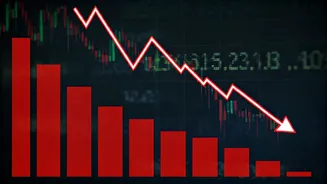Outflows Persist
Recent data reveals a concerning pattern within the Indian financial market: for ten consecutive weeks, funds have been witnessing redemptions. This extended
period of outflow signifies a notable shift in investment trends. The consistent selling of assets reflects a general sentiment of caution or a strategic reallocation of funds by investors, potentially driven by varied economic or geopolitical factors. These repeated redemptions highlight the need to closely analyze the underlying reasons behind the diminishing interest in Indian-based funds. Such prolonged trends can impact market stability, and the ability of businesses to raise capital, thereby affecting the nation's economic progress.
Investor Sentiment Shifts
The ongoing redemptions likely mirror a change in investor perceptions towards the Indian market. Several elements could be contributing to this shift. These include global economic uncertainties, shifts in currency valuations, and alterations in the regulatory landscape. Investors could also be seeking opportunities in other markets that appear to offer more attractive returns or lower risks. The duration and magnitude of these outflows suggest that current investor confidence is wavering. This has raised concerns among analysts who watch the market carefully. Understanding this shift requires a deeper look at the specific triggers affecting investment decisions and the current risk appetite among different types of investors, be it domestic or international.
Global Flow Rotations
The outflow from Indian funds may be viewed as part of a wider pattern of global investment rotations. Factors such as shifts in interest rates, changes in the value of the US dollar, and evolving geopolitical conditions can lead investors to rebalance their portfolios. In this context, India's market could be experiencing an adjustment as funds flow towards markets seen as more stable, growing, or offering better risk-adjusted returns. These broader market dynamics underscore the interconnectedness of financial markets worldwide. Examining these global patterns helps explain the movement of capital, revealing how India fits within the evolving investment universe. It is critical to grasp how global events affect domestic markets and anticipate any ripple effects.
Potential Market Impact
The consecutive weeks of redemptions could bring about different consequences for the Indian market. Increased selling pressure can drive down asset prices, potentially affecting the performance of Indian stocks and bonds. This can lower overall market confidence, possibly leading to further outflows and impacting the ability of Indian companies to raise capital. Such market fluctuations can affect the stability of financial institutions and influence business activity across the economy. Monitoring these effects closely is important. Regulatory bodies and market participants need to be prepared to take steps to mitigate potential negative effects. This includes risk management, implementing measures to stabilize the market, and creating a conducive environment for investor confidence.
Reasons Behind Redemptions
Several factors might contribute to the ongoing redemptions. Investors could be reacting to current domestic economic data or reacting to changes in the government's policies. Concerns about inflation, interest rate hikes, or the fiscal health of the country can affect market confidence, leading to sell-offs. Moreover, external factors such as global recessions or geopolitical issues can also contribute to the downturn, causing uncertainty. Analyzing the interplay between these domestic and external influences gives a clearer view of why investors are taking their money out. This requires a detailed examination of macroeconomic indicators, market sentiment, and any regulatory shifts that might be influencing the decision-making of investors.
Future Outlook
The continuation of these outflow trends necessitates a close look at the future of the Indian financial market. Depending on the reasons driving redemptions, the market could see further corrections or experience a period of stabilization, or potentially even recovery. The government and regulatory bodies can implement measures to mitigate investor concerns and boost confidence. This includes providing economic certainty, encouraging strategic investments, and developing policies that foster long-term growth. Investors' reactions to future economic data releases, regulatory announcements, and global events will play a vital role in determining how the market adjusts. Observing these factors is critical to understand the future direction and sustainability of the Indian financial market.













